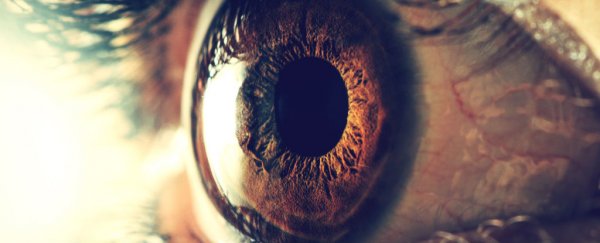Don't sit so close to the television, your eyes are going to go square. Don't read your book in low light, you're going to strain your eyes. But if you absolutely have to, you should eat more carrots to help you see the pages better. Sound familiar? Every single one of us likely grew up with at least one of these instructions, and while a fear of blindness is a pretty good way to get kids to do what you tell them, none of them are actually based on any real science. So pull up a chair nice and close to the screen so Elliott can bust some eye myths in the latest episode of Mental Floss.
First off, if you were ever guilty of reading Goosebumps under the covers so your parents wouldn't catch you, don't worry - your eyes aren't going to suffer the effects of your sneaky childhood deception (that your parents totally knew about btw). So far, there's been no scientific evidence that reading in the dark is bad for your eyes, and optometrists generally won't have a problem with you doing it unless you're going so far as to give yourself eye strain and headaches.
Having said that, the video does mention that an Australian study has found that children who play outdoors are less likely to develop short-sightedness than those who spend most of their time indoors. So read your books in the dark if you have to, but don't forget to take in some sunlight and stretch your eye muscles during the day too.
And on that note, don't worry about your eyes going square from sitting really close to the TV either - just like reading in the dark, no long-term effects have been linked to this, and the worst that could happen is you'll get headaches from eyestrain if you're doing it for too long without a break. Unlike the reading in the dark myth, this misconception is actually rooted in some science. As Elliott explains, the earliest televisions actually emitted X-rays, which could well have damaged viewers' eyes if they sat too close to the screen, but today's televisions carry no such risk.
If you've been keeping up your carrot intake to give yourself better-than-average night vision, you're more likely to turn yourself orange than enjoy these kinds of effects. The myth stems from the fact that carrots contain β-Carotene - a red-orange pigment found in fruits and vegetables that our bodies need to produce vitamin A, which is vital for good eyesight. But you only need a tiny amount of vitamin A, and you can get it from a whole range of foods, such as milk, cheese, pumpkin, and spinach.
Worried about your contact lenses getting stuck behind your eye (ew) or your glasses making your eyesight progressively worse? Don't worry - actual science is here to set things straight. Watch the video above to find out what you should or shouldn't be doing with your eyes. No one's getting an eye transplant any time soon, so you don't want to screw these ones up.
